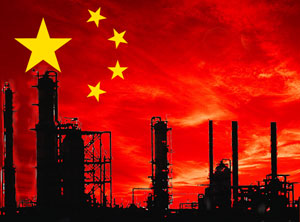The Chinese Yuan and Oil Prices

Although this article was written in 2005, it remains relevant today. The prediction was spot on.
Prophetic? No. Just good work.
Yuan Revaluation Would Raise Oil Prices to New Records
Published on Mon, 11 Apr 2005 – Volume: 48 Issue: 15
Middle East Economic Survey
By A F Alhajji
The following article was written by Dr Alhajji for Gulf in the Media, an affiliate of the Gulf Research Center in Dubai. It is republished in MEES with permission.
As pressures from the US, Japan, and some European countries mount on China to revalue its currency, currency traders and speculators moved substantial funds to China to generate quick profits in anticipation of Chinese Government decision to revalue its Currency, the yuan. Currency traders are so confident that China will revaluate its currency that the value of the yuan in the futures market is 4.5% higher than its current FIXED exchange rate!
China can revalue its currency by ending its peg to the dollar and allowing it to float, or by keeping its peg to the dollar but at a lower exchange rate than the current 8.277 yuans/$; which will make the dollar worth less than 8.277 yuans. Officials in the countries that pressure China to revalue its currency think that the current price of the yuan is set lower than its true market value by 15-to-40%. They hope that appreciation of the Chinese currency would reduce the competitiveness of Chinese products in the international markets and make some room for their own exports, including exports to China. Revaluation of the yuan might help some of these countries, especially the US, reduce their trade deficits.
The benefits from a yuan revaluation may not materialize. Instead, it might make the situation worse. Those who see benefits ignore the effect of the appreciation of the yuan on current oil markets. Revaluation would increase China’s oil demand and reduce world oil supply. If oil market fundamentals stay the same, a yuan revaluation would bring oil prices to new record highs. In this case, the increase in oil prices would wipe out any benefits that the US or others may gain from the yuan revaluation.
Revaluation Would Increase Demand For Oil
Experts agree that one of the main reasons for the increase in oil prices in recent months is the “ever increasing” demand for oil in China. They also agree that the Chinese economy has not wavered in the face of record-high oil prices. Revaluation of the yuan through a limited change in its peg or by floating it might increase its value between 5% and 40%. Since oil is priced in US dollars, any yuan revaluation would make oil cheaper from the Chinese point of view. For example, if the yuan exchange rate relative to the dollar were to increase by 20%, the cost of Chinese oil imports would decrease by 20%. In today’s oil markets, this change could produce more than $2bn in savings a year. China would spend this additional income, represented by increasing purchasing power, on oil and other items. While no one knows for sure how much China’s oil demand would increase as a result of a yuan revaluation, the current tight oil market indicates that oil producers cannot meet any incremental demand, which would force oil prices even higher. Experts do not expect OPEC capacity to increase fast enough to meet the increasing world demand, even without a yuan revaluation. One can only imagine what would happen if China floated its currency. Once oil prices increase, countries that lobbied for the revaluation may regret their efforts as their higher oil import bills wipe out all their export gains. In addition, their exports to poorer underdeveloped countries could also decline as these countries struggle to pay for the additional energy cost. Given the low price and income elasticities of demand for oil, developing countries have no choice but to pay oil import bills at the expense of other imports from countries that lobbied for revaluation of the yuan.
Revaluation Would Hurt Oil Producing Countries and May Limit Supply
Experts predict that if China were to revalue its yuan, the currencies of other Asian countries would also appreciate, including the Japanese yen. This appreciation in Asian currencies would hurt oil producers, especially countries that peg their currencies to the dollar, such as the Gulf States. From the oil producers’ point of view, the appreciation of Asian currencies would be just another devaluation of the dollar. Their purchasing power would decline and inflation rates would increase. Data indicate that Gulf countries’ imports from Asia have increased steadily in the last few years, especially from China. The imports of the six GCC members from China have increased by more than tenfold since 1991. It increased by more than 45% in 2003 alone. China was the ninth largest exporter to Saudi Arabia in 1991. Now it holds the fourth place and may move to third place next year.
This increase in imports from China would make the impact of a yuan revaluation on purchasing power and inflation in the GCC countries significant. Since these countries peg their currency to the dollar, a yuan revaluation would effectively mean devaluation of their currencies. Based on current trade patterns, a revaluation of the Chinese yuan by 10% would cost Saudi Arabia about $224mn a year. By today’s average of Saudi oil prices, Saudi Arabia has to sell an additional 6.5mn barrels just to buy the same amounts of goods and services that it bought from China last year. The whole Gulf region would need to produce more than 8mn barrels to compensate for the losses in purchasing power from a 10% appreciation of the yuan. Since they cannot increase production, they may prefer to increase prices as numerous statements by officials from these countries have indicated in recent months.
Statistical analysis of economic data of the oil producing countries indicates that if oil prices were to stay the same, the appreciation of currencies other than the dollar would lead to inflation, lower economic growth, higher unemployment, and lower investment in the oil sector. Therefore, a yuan revaluation would lead to higher oil prices through increased demand and the possibility that OPEC members would increase oil prices to compensate for the loss of purchasing power of their oil exports.
Even if OPEC members do not increase prices to avoid lower economic growth, oil prices will increase anyway. Lower purchasing power and rising inflation will force oil producing countries to spend less on production capacity expansion and make them unable to meet the ever-increasing demand for oil. Therefore, a yuan revaluation would increase oil prices under any scenario. With the expectations of a yuan revaluation, it is little wonder that oil prices continue to head north.













Comment